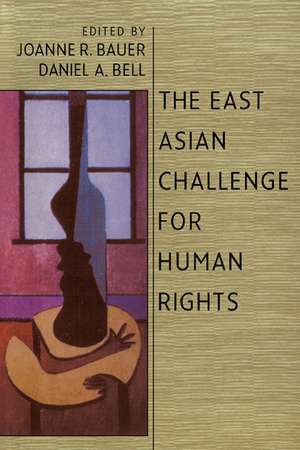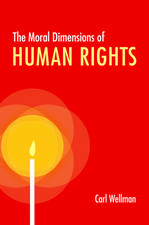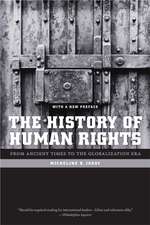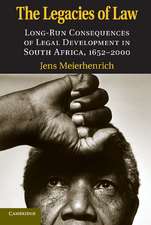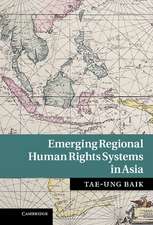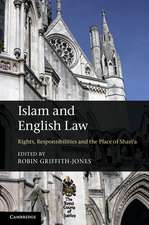The East Asian Challenge for Human Rights
Editat de Joanne R. Bauer, Daniel A. Bellen Limba Engleză Paperback – 12 feb 1999
Preț: 401.19 lei
Nou
Puncte Express: 602
Preț estimativ în valută:
76.77€ • 80.37$ • 63.52£
76.77€ • 80.37$ • 63.52£
Carte tipărită la comandă
Livrare economică 07-21 aprilie
Preluare comenzi: 021 569.72.76
Specificații
ISBN-13: 9780521645362
ISBN-10: 0521645360
Pagini: 412
Ilustrații: 1 table
Dimensiuni: 152 x 229 x 23 mm
Greutate: 0.61 kg
Ediția:New.
Editura: Cambridge University Press
Colecția Cambridge University Press
Locul publicării:New York, United States
ISBN-10: 0521645360
Pagini: 412
Ilustrații: 1 table
Dimensiuni: 152 x 229 x 23 mm
Greutate: 0.61 kg
Ediția:New.
Editura: Cambridge University Press
Colecția Cambridge University Press
Locul publicării:New York, United States
Cuprins
Preface; Part I: 1. Introduction; Part II. Critical Perspectives on the 'Asian Values' Debate: 2. A post-Orientalist defense of liberal democracy for Asia Tatsuo Inoue; 3. Human rights and Asian values Jack Donnelly; 4. Human rights and economic achievements Amartya Sen; Part III. Toward a More Inclusive International Regime: 5. Towards an intercivilizational approach to human rights Yasuaki Onuma; 6. Conditions of an unforced consensus on human rights Charles Taylor; Part IV. Culture and Human Rights: 7. The cultural mediation of human rights: the Al-Arqam case in Malaysia Abdullahi An-Na'im; 8. Grounding human rights Arguments in Non-Western Culture: Shari'a and the citizenship rights of women in a modern Islamic nation-state Norani Othman; 9. Looking to Buddhism to turn back Thai prostitution in Southeast Asia Suwanna Satha-Anand; 10. A Confucian perspective on human rights Joseph Chan; Part V. Economic Development and Human Rights: 11. Rights, social justice and globalization in East Asia Yash Ghai; 12. Economic development, legal reform, and rights in Singapore and Taiwan Kevin Y. L. Tan; 13. Human rights issues in China's internal migration: insights from comparisons with Germany and Japan Dorothy Solinger; 14. The anti-nuclear-power movement and the rise of rights consciousness in Taiwan Mab Huang; 15. The applicability of the international legal concept of 'Indigenous Peoples' in Asia Benedict Kingsbury; Notes; Tables.
Recenzii
"This is an outstanding book on a whole set of crucial cross cultural issues we face: are we morally entitled to judge people of different cultures? And if the answer is in the affirmative--on what grounds? The book has profound implications for our treatment of individual rights in authoritarian societies, female circumcision and child labor, role of women and relations among races and many other challenging moral and political issues of the day." Amitai Etzioni, author of The New Golden Rule: Community and Morality in a Democratic Society (Basic Books, 1996)
"This volume should become the leading work in this important field. It should be required reading for all those with a serious interest in human rights and in East Asian Studies. It will also be of interest to those interested in 'globalization' and the politics of cultural diversity." Michael Freeman, Department of Government; and Human Rights Centre, University of Essex
"Argument over so-called Asian and Western values continues to occupy political leaders, human rights scholars and advocates, historians and anthropologists, journalists, others. Like other highly politicized debates, it frequently yields more heat than light. This collection of essays succeeds in illuminating the debate's premises, aspirations and many inaccuracies. The distinguished authors cut well beneath the level of simple assertion to inquiry conceptually and historically into claims that are made to distinguish an Asian from a Western or univeral view of human rights, and to make creative proposals for ways out of these dilemmas. It leaves this field of inquiry well ahead of where it found it." Henry J. Steiner, Jeremiah Smith, Jr. Professor of Law and Director, Human Rights Program, Harvard University
"To allow the West to define 'universal' human rights seems wrong; to condone the abuses of authoritarians who hide behind 'non-Western values' seems equally wrong. This judicious and multifaceted book addresses the difficult but vitally important area that lies behind these two intuitions: What basic human values are shared in today's global village? How can we forge from them common conceptions of human rights?" Perry Link, Princeton University
"This volume ['s]...fourteen chapters, written by authors from various disciplines, address many of the main issues in the [universal human rights] debate from a variety of angles, invariably with sophistication and insight. The authors avoid the tendency to attack straw men, offering instead arguments filled with nuance and qualifications." China Review International
"This volume should become the leading work in this important field. It should be required reading for all those with a serious interest in human rights and in East Asian Studies. It will also be of interest to those interested in 'globalization' and the politics of cultural diversity." Michael Freeman, Department of Government; and Human Rights Centre, University of Essex
"Argument over so-called Asian and Western values continues to occupy political leaders, human rights scholars and advocates, historians and anthropologists, journalists, others. Like other highly politicized debates, it frequently yields more heat than light. This collection of essays succeeds in illuminating the debate's premises, aspirations and many inaccuracies. The distinguished authors cut well beneath the level of simple assertion to inquiry conceptually and historically into claims that are made to distinguish an Asian from a Western or univeral view of human rights, and to make creative proposals for ways out of these dilemmas. It leaves this field of inquiry well ahead of where it found it." Henry J. Steiner, Jeremiah Smith, Jr. Professor of Law and Director, Human Rights Program, Harvard University
"To allow the West to define 'universal' human rights seems wrong; to condone the abuses of authoritarians who hide behind 'non-Western values' seems equally wrong. This judicious and multifaceted book addresses the difficult but vitally important area that lies behind these two intuitions: What basic human values are shared in today's global village? How can we forge from them common conceptions of human rights?" Perry Link, Princeton University
"This volume ['s]...fourteen chapters, written by authors from various disciplines, address many of the main issues in the [universal human rights] debate from a variety of angles, invariably with sophistication and insight. The authors avoid the tendency to attack straw men, offering instead arguments filled with nuance and qualifications." China Review International
Descriere
This book identifies the more persuasive contributions by East Asian intellectuals to the international human rights debate.
